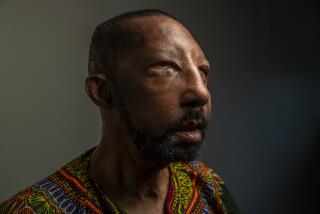A Half-Smile : Girl Develops Beginnings of Grin 7 Weeks After Surgery
- Share via
PALMDALE — Doctors had warned 7-year-old Chelsey Thomas not to even attempt a smirk, for fear of injuring a muscle transplanted from her thigh to her left cheek.
But seven years is a long time to wait for a smile. So each morning, for weeks, Chelsey got up, walked to the bathroom, brushed her teeth and looked in the mirror. Each morning, nothing.
Then, exactly seven weeks after she underwent the first of two plastic surgeries to correct a rare neurological condition that prevented her facial muscles from working, it happened:
“Mommy,” she said, “I think I felt something.”
Lori Thomas looked closely. “Sure enough, I saw a little quiver,” she said. As the muscle grew stronger, the quiver developed into a half grin.
“It’s closer to a third of a grin,” said Lori Thomas, with a laugh. “You can definitely see her mouth pull upward. It means the surgery was a success.” The next operation is scheduled for April 23 at the Kaiser Permanente Woodland Hills Regional Medical Center.
Chelsey is one of less than 500,000 people worldwide affected by Moebius syndrome, a rare medical condition that causes partial paralysis of some facial muscles. About a year ago, when some of her classmates started teasing her about her inability to smile, Chelsey told her parents she wanted to have plastic surgery to fix the problem.
Lori and Bob Thomas agreed to check out the possibility. But because the condition was so uncommon, few plastic surgeons had ever attempted the delicate, marathon-like surgeries required to correct the condition.
Also, the Thomases were not sure their insurance policy would cover the cost, estimated at well over $70,000.
After researching it, the Thomases learned of a Canadian micro-vascular surgeon, Dr. Ronald Zuker, who had successfully performed about a dozen surgeries on patients with Moebius syndrome. He agreed to come to Los Angeles to try the surgery on Chelsey. Shortly thereafter, Kaiser Permanente informed the Thomases that the cost was fully covered under their policy.
Chelsey’s first surgery was scheduled for Nov. 21, but after she was anesthetized, doctors noticed a tiny fever blister on her lip. The presence of a virus jeopardized the surgery, and the operation was canceled.
On Dec. 15, Zuker tried again, and after more than 10 hours of surgery in which a muscle and functional nerves were transplanted to her left cheek, the operation appeared to be successful. Still, doctors said Chelsey would not know if the new muscle would work properly for about eight weeks.
In the meantime, the second-grader became something of a celebrity, appearing on talk shows, national and international news broadcasts and in scores of newspaper and magazine articles, often identified as the “girl who can’t smile.”
“We’d be walking down the street and someone would recognize her,” Lori Thomas said this week. “They ask her how she’s doing, and she shows them the smile.
“Now, they’re calling her the ‘smile girl.’ ”






